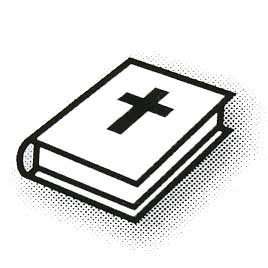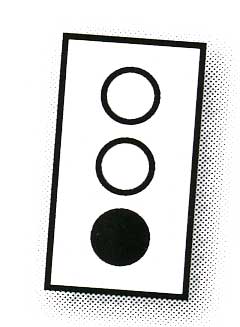Staying
on Track - Lent Studies for 2006
(Overview and sample material)
(Overview and sample material)
Introduction
to
the studies.

It has been said before, but it is worth
repeating: life is a journey and the journey is just as important as the
destination. Life can be a journey with joys, pleasures and surprises.
Occasionally it may be bumpy and rough as well when we are faced with
challenges from time to time.
The Christian life is also a journey. However, the Christian does not journey alone; they journey with God and with the other Christians, usually from their community of faith. The question for the Christian is not, “Where is God?” but “Where am I in relation to God?”
Over the centuries, Lent has had many foci and no one Lenten study can cover all aspects. Three years ago with “Lent Re-Visited” the studies were based on the Gospel readings for Year B. It is Year B again in the lectionary cycle and this time the studies are based on both the Old Testament readings for each of the Sundays and the Epistle (or New Testament Letter) Readings.
One of the Lenten focuses is to use the season to see if we are on track with God. On the cover of the book we have rail tracks. These pieces of steel serve many functions. One is to provide direction for the train. Lent is a time for us to examine to see if we are on track with God and in fact heading in the direction God intends for us. Sometimes trains can be shunted off into sidings. In living out our Christian faith, it is easy to find ourselves so preoccupied that we find ourselves unintentionally “in a siding”, waiting for something to happen. The tracks on the cover show a number of rail points that can be moved so that the train goes in a particular direction. Lent is a time to ask ourselves: are we open to God pointing us in a particular direction, or are we setting the direction and hoping God agrees?
Sadly at times trains can be de-railed. There are many influences in the community that can de-rail us in terms of our faith, growth and development. Lent is a time to make sure we are not being de-railed, or if we are de-railed, then seeking how God can put us back on track. Sometimes the rail line can be blocked. I live near a train station. One morning I went to the shop after a very strong wind the night before. As I was walking back, I realized that the whole area was so quiet. There were no trains running. A tree had fallen over the electricity lines. Lent is also a time to make sure we clear any ‘blockages’ in our Christian journey.
Each track has two lines. They are parallel and they run in the same direction. These studies explore the two facets: the covenant relationship between God and some of the Old Testament characters, and the New Testament readings with their themes of baptism, faith, wisdom, mercy, grace, obedience and nurture.
Each study will seek to make connections between the readings. Our group sessions will act like the sleepers, connecting the Old Testament line with the New Testament line in the hope that we will find ourselves not only on track with God, but heading in the same direction with God, so that we can celebrate Easter, the key day of the Church’s year, with joy and thanksgiving.
The Christian life is also a journey. However, the Christian does not journey alone; they journey with God and with the other Christians, usually from their community of faith. The question for the Christian is not, “Where is God?” but “Where am I in relation to God?”
Over the centuries, Lent has had many foci and no one Lenten study can cover all aspects. Three years ago with “Lent Re-Visited” the studies were based on the Gospel readings for Year B. It is Year B again in the lectionary cycle and this time the studies are based on both the Old Testament readings for each of the Sundays and the Epistle (or New Testament Letter) Readings.
One of the Lenten focuses is to use the season to see if we are on track with God. On the cover of the book we have rail tracks. These pieces of steel serve many functions. One is to provide direction for the train. Lent is a time for us to examine to see if we are on track with God and in fact heading in the direction God intends for us. Sometimes trains can be shunted off into sidings. In living out our Christian faith, it is easy to find ourselves so preoccupied that we find ourselves unintentionally “in a siding”, waiting for something to happen. The tracks on the cover show a number of rail points that can be moved so that the train goes in a particular direction. Lent is a time to ask ourselves: are we open to God pointing us in a particular direction, or are we setting the direction and hoping God agrees?
Sadly at times trains can be de-railed. There are many influences in the community that can de-rail us in terms of our faith, growth and development. Lent is a time to make sure we are not being de-railed, or if we are de-railed, then seeking how God can put us back on track. Sometimes the rail line can be blocked. I live near a train station. One morning I went to the shop after a very strong wind the night before. As I was walking back, I realized that the whole area was so quiet. There were no trains running. A tree had fallen over the electricity lines. Lent is also a time to make sure we clear any ‘blockages’ in our Christian journey.
Each track has two lines. They are parallel and they run in the same direction. These studies explore the two facets: the covenant relationship between God and some of the Old Testament characters, and the New Testament readings with their themes of baptism, faith, wisdom, mercy, grace, obedience and nurture.
Each study will seek to make connections between the readings. Our group sessions will act like the sleepers, connecting the Old Testament line with the New Testament line in the hope that we will find ourselves not only on track with God, but heading in the same direction with God, so that we can celebrate Easter, the key day of the Church’s year, with joy and thanksgiving.
Study 1 - Whose track are we on –
ours or God’s?
Readings: Genesis 9:8-17: 1 Peter 3:18-22
Study Two - Promise, Patience and Purpose
Readings: Genesis 17:1-7; 15-16: Romans 4:13-25
Study Three - Do we really serve God?
Readings: Exodus 20:1-17: 1 Corinthians 1:18-25
Study Four - Some Realities of Life and God’s
Grace:
Readings: Numbers 21:4-9: Ephesians 2:1-10
Study Five - Continuing on the Track with others.
Readings Jeremiah 31:31-34: Hebrews 5:5-14
Theme
- We really serve God?
Readings: Exodus 20:1-17 1 Corinthians 1:18-25
Introduction: The Ten Commandments or the Decalogue: are they old hat or are they just as relevant today as when they were given to Moses on Mount Sinai? When it comes to staying on track, the Commandments greatly assist us. They are not just a list of negatives, as some would say, they are God’s way of establishing and maintaining our relationship with our Creator. They are not freedom restrictors, as some argue, but the Commandments enliven and equip us as to stay on track with God. While they were given by God to Moses and Israel quite some time ago they are still relevant to us in 2006.
I wonder at times whether the Ten Commandments are seen as unimportant because of the way the Church has taught them. I recall being in a R.E. class at school and the teacher, a minister from one of the churches in the town, was teaching us about commandment seven, “You shall not commit adultery.” He had a bowl of distilled water and we talked about the properties of distilled water, and then he poured some Indian ink into the distilled water. He said, “That is adultery”. This was before the Family Law Act of 1961 and people went to court for divorce. As a kid, I could not believe that people went to court for pouring Indian ink into distilled water! Also I thought what a waste of both distilled water and ink. Perhaps Ronald Goldman was right when he wrote his book, “Readiness for Religion” (Seabury 1965) that not every biblical account is suitable for every child of every age. I am glad that I have had teachers since, who have helped me to explore the Ten Commandments in a new, energizing and creative way.
The Commandments commence by stating that we are to be on track with God and God alone. “I am the Lord your God” and “You shall not make for yourself an idol .. bow down to them or worship them.” (Exodus 20:2-5). It is so easy to “jump” tracks and find ourselves on the idolatry track worshiping other items, such as cars, a piece of furniture or a particular object of fascination, but it is God whom we serve. It is interesting that God acknowledges that there are other gods out there, which are in conflict with God and compete for our attention.
God’s name is important and for Israelites names are very important as discussed in Study Two.
When God created the world, he created the Sabbath Day as a day of rest. This is a very important principal of life and I am concerned that we have lost it at present. Back in the time of Moses it was a day to recuperate after six days hard work as a slave or owner. Today within society there is strong focus on consumerism and productivity making it very easy to “reduce” the Sabbath to another economic opportunity. (See Going Further) In the press we often hear reports about people working longer and longer hours, while others have no work at all. Does this commandment need to be revisited in our day and age?
The other Commandments address the social relations within the human community concerning both people and property and are straight forward.
When I was young I was taught that the first three (and some scholars argue that first four) address our relationship with God and the remainder of the Commandments address our responsibility to our neighbour. I learnt that when it was God first, the rest take care of themselves. While it is simplistic, there is some truth to it.
The Ten Commandments state something of the nature of God and the way God wants to life to be lived if we are to be track with God. As Christians we are not called to just know about God, we are called to know God. It has been said that the longest journey some people make in their lives is about 33 cms. (or 13 inches on the imperial scale), the distance from the head to the heart. With head knowledge we know about, whereas with the heart we know intimately.
Our call as Christians is to know God in all facets of our life. It is so easy to think of life as separate tracks, our home life track, our work life track, our social life track and our Christian life track etc. But the Christian life is a single track which journeys with and through the terrain of home life, employment, social life and so on. Yes there are times when we stop at for example, the station of employment and take time to walk with God as we address a number of issues concerning staying on track. There are also times when we need to stop because of the red light and wait on God before we receive the green light. The same is true as we address a range of matters in the daily routine of life. One of the skills in living out Christian faith is knowing that while we are on track we may need to stop and reassess challenges and issues in our life.
How we come to know God is shaped by how we approach the task of knowing. (See Going Further – in regard to topic of Knowing and Knowledge) In Paul’s letter to the Corinthians, Paul was addressing the matter in the life of that Church. Some people followed Apollos, others Paul and so on, but Paul was stating that we are to follow Christ. We come to know God through knowing the crucified and resurrected Christ, our servant King. This knowledge and the commandments are the framework that keeps us on track in serving God and those around us.
Readings: Exodus 20:1-17 1 Corinthians 1:18-25
Introduction: The Ten Commandments or the Decalogue: are they old hat or are they just as relevant today as when they were given to Moses on Mount Sinai? When it comes to staying on track, the Commandments greatly assist us. They are not just a list of negatives, as some would say, they are God’s way of establishing and maintaining our relationship with our Creator. They are not freedom restrictors, as some argue, but the Commandments enliven and equip us as to stay on track with God. While they were given by God to Moses and Israel quite some time ago they are still relevant to us in 2006.
I wonder at times whether the Ten Commandments are seen as unimportant because of the way the Church has taught them. I recall being in a R.E. class at school and the teacher, a minister from one of the churches in the town, was teaching us about commandment seven, “You shall not commit adultery.” He had a bowl of distilled water and we talked about the properties of distilled water, and then he poured some Indian ink into the distilled water. He said, “That is adultery”. This was before the Family Law Act of 1961 and people went to court for divorce. As a kid, I could not believe that people went to court for pouring Indian ink into distilled water! Also I thought what a waste of both distilled water and ink. Perhaps Ronald Goldman was right when he wrote his book, “Readiness for Religion” (Seabury 1965) that not every biblical account is suitable for every child of every age. I am glad that I have had teachers since, who have helped me to explore the Ten Commandments in a new, energizing and creative way.
The Commandments commence by stating that we are to be on track with God and God alone. “I am the Lord your God” and “You shall not make for yourself an idol .. bow down to them or worship them.” (Exodus 20:2-5). It is so easy to “jump” tracks and find ourselves on the idolatry track worshiping other items, such as cars, a piece of furniture or a particular object of fascination, but it is God whom we serve. It is interesting that God acknowledges that there are other gods out there, which are in conflict with God and compete for our attention.
God’s name is important and for Israelites names are very important as discussed in Study Two.
When God created the world, he created the Sabbath Day as a day of rest. This is a very important principal of life and I am concerned that we have lost it at present. Back in the time of Moses it was a day to recuperate after six days hard work as a slave or owner. Today within society there is strong focus on consumerism and productivity making it very easy to “reduce” the Sabbath to another economic opportunity. (See Going Further) In the press we often hear reports about people working longer and longer hours, while others have no work at all. Does this commandment need to be revisited in our day and age?
The other Commandments address the social relations within the human community concerning both people and property and are straight forward.
When I was young I was taught that the first three (and some scholars argue that first four) address our relationship with God and the remainder of the Commandments address our responsibility to our neighbour. I learnt that when it was God first, the rest take care of themselves. While it is simplistic, there is some truth to it.
The Ten Commandments state something of the nature of God and the way God wants to life to be lived if we are to be track with God. As Christians we are not called to just know about God, we are called to know God. It has been said that the longest journey some people make in their lives is about 33 cms. (or 13 inches on the imperial scale), the distance from the head to the heart. With head knowledge we know about, whereas with the heart we know intimately.
Our call as Christians is to know God in all facets of our life. It is so easy to think of life as separate tracks, our home life track, our work life track, our social life track and our Christian life track etc. But the Christian life is a single track which journeys with and through the terrain of home life, employment, social life and so on. Yes there are times when we stop at for example, the station of employment and take time to walk with God as we address a number of issues concerning staying on track. There are also times when we need to stop because of the red light and wait on God before we receive the green light. The same is true as we address a range of matters in the daily routine of life. One of the skills in living out Christian faith is knowing that while we are on track we may need to stop and reassess challenges and issues in our life.
How we come to know God is shaped by how we approach the task of knowing. (See Going Further – in regard to topic of Knowing and Knowledge) In Paul’s letter to the Corinthians, Paul was addressing the matter in the life of that Church. Some people followed Apollos, others Paul and so on, but Paul was stating that we are to follow Christ. We come to know God through knowing the crucified and resurrected Christ, our servant King. This knowledge and the commandments are the framework that keeps us on track in serving God and those around us.

• Do you have a favourite prayer? If yes, what is it and why is it your favourite?
• Corrie ten Boon asked, “Is prayer your steering wheel or your spare tyre?” Share your thoughts.
• What has been a worship highlight for you recently?
From last week: Any questions that have arisen from our time together last week that you would like to ask or insight that you would like to share.

Say together the Lenten Prayer:
Almighty and everlasting God,
you hate nothing that you have made,
and you forgive the sins of all who are penitent:
create and make in us new and contrite hearts,
that we, worthily lamenting our sins,
and acknowledging our wretchedness,
may obtain of you, the God of all mercy,
perfect remission and forgiveness;
through Jesus Christ our Lord. Amen.

People are invited to share their responses to one or more the following:
• Did you have to learn the Ten Commandments off by heart when you were young? If so what were your thoughts at the time? If not, do you think this practice would have helped you?
• Have children challenged you with their questions about the various biblical accounts? You may like to share a particular example and your response.
• Because human beings are all different there will never be one 100% agreement on any given topic. How do you cope with differing views or attitudes such as at a meeting?
• As we are mid way through Lent how are you travelling?

Exodus 20:1-17
1 Corinthians 1:18-25

(Please make a selection)
1. In times past, the Ten Commandments were included in our liturgies more frequently than they are now. Do you think we have lost something by not saying them as often or do you think this has been a positive move? Explain your reasons for this opinion.
2. What place do you think the Ten Commandments should have in the life of the Church and of society?
3. There once was a view held by some that all biblical accounts were suitable for people of all ages. With research, this view is not longer has widespread support. How do you think we should introduce the Bible to children and is there a place to make sure certain stories (e.g. David and Bathsheba – 2 Samuel 11) are not told until a certain age?
4. How would you explain the first commandment to a person wanting to know what it means?
5. More and more people are saying that they have less time for a wide range of reasons. Is there a place for Christians to re-visit the ‘sabbath day’ and the ‘sabbath rest’ principle again? By not attending to the Sabbath is there a danger of de-railing ourselves, so how can we maintain our focus on God and keep on track?
6. Share your insights in regard to the expression, “If you attend to God first, the rest will take care of itself”.
7. Which of the Commandments give you comfort and which of the Commandments challenge you and why? You are invited to share your insights, but please be sensitive to others in the group.
8. Paul was addressing the matter of division within the Church at Corinth. All churches, all denomination have divisions, because people come with differing ideas and thoughts. How does your church, your parish, your community of faith address division and disagreement?
9. Listening to the radio recently the speaker was saying that the ecumenical movement has lost it influence and the vision needs to be re-captured? Do you agree? Is there place for the ecumenical movement today?
10. It has been said that each church is preoccupied in trying to survive and we no longer have time to attend to the ecumenical matters. However others out forward the idea that we may have to re-visit ecumenism in order to survive as a church. Denominationalism is accused of not being a positive witness to the community. How would you reply to these statements and why?

Lord our God,
by your Holy Spirit
write your commandments upon our hearts
and grant us the wisdom and power of the cross,
so that, cleansed from greed and selfishness,
we may become a living temple of your love;
through Jesus Christ our Lord. Amen.


Read Numbers 21:4-9 & Ephesians 2:1-10.
Questions to ponder:
• Reflect on how you prepare yourself for worship. Bishop Neville Chynoweth said that the Ten Commandments are an excellent tool in preparing ourselves for worship.
• The Rector that prepared me for Confirmation, used to say that it was important to prepare yourself for worship. He said that there were three areas we should look at, who and what you will give thanks to God for, what you will confess and who or what you will pray for as you go forth in faith into the week ahead. I hope this is helpful for you.
• Consider how you would describe your prayer life at the moment. Are there areas that need to be addressed?